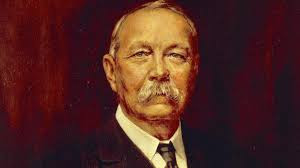What ineffable twaddle!
The greatness of ACD’s writing came home to me again recently while I was editing the second volume of my Essential Sherlock Holmes biographical anthology. Reading The Sign of (the) Four more slowly than usual, I was struck by the lyricism of certain passages. Such as this paragraph from the third chapter:
It was a September evening, and not yet seven o’clock, but the day had been a dreary one, and a dense drizzly fog lay low upon the great city. Mud-coloured clouds drooped sadly over the muddy streets. Down the Strand the lamps were but misty splotches of diffused light which threw a feeble circular glimmer upon the slimy pavement. The yellow glare from the shop-windows streamed out into the steamy, vaporous air, and threw a murky, shifting radiance across the crowded thoroughfare. There was, to my mind, something eerie and ghost-like in the endless procession of faces which flitted across these narrow bars of light,—sad faces and glad, haggard and merry. Like all human kind, they flitted from the gloom into the light, and so back into the gloom once more. I am not subject to impressions, but the dull, heavy evening, with the strange business upon which we were engaged, combined to make me nervous and depressed. I could see from Miss Morstan’s manner that she was suffering from the same feeling. Holmes alone could rise superior to petty influences. He held his open note-book upon his knee, and from time to time he jotted down figures and memoranda in the light of his pocket-lantern.
That’s real writing! And it’s not even the best in the Canon, to my taste. I think the first and last paragraphs of “His Last Bow” are among the finest matched sets in literature, on a par with A Tale of Two Cities and The Great Gatsby. You just can’t beat the opening for mood-setting—a mood that is carried through to the end.
How good it is that with the formation of the ACD Society and the Conan Doyle Review the man behind the Master is getting his due!

No comments:
Post a Comment